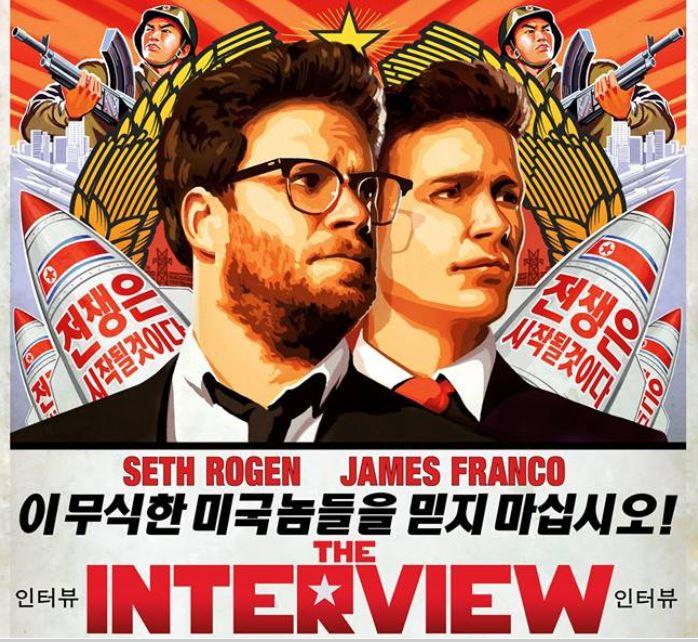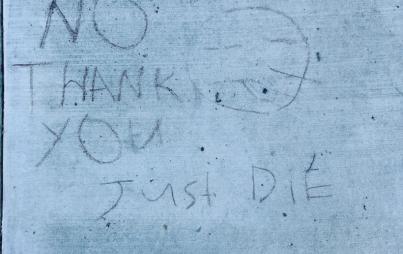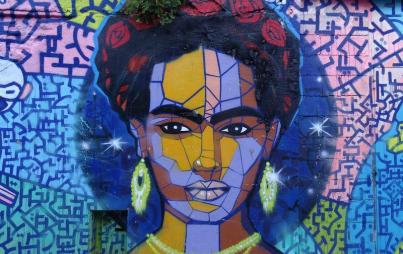
Credit: Facebook
In one of history's most unlikely high-profile battles, a North Korean cyber-terrorist group has taken on a major Hollywood studio . . . and won.
On the heels of a humiliating email hack and threats about a 9/11-style attack on U.S. theaters, Sony Pictures Classics has announced it is pulling the plug on the planned Christmas day release of The Interview, the Seth Rogen and James Franco comedy about taking down North Korean leader Kim Jong-un.
Far from being the work of a fringe group, it was announced today that the cyber-terrorist group was sanctioned by North Korean leaders, and the incident has drawn the focus of the White House, with the Department of Homeland Security investigating the validity of the threat (it announced it found no evidence that an attack would actually happen, an admission that wasn't enough to halt Sony's decision).
The episode is a stunning act of first speech censorship and fear-mongering. As many have noted, it also sets a chilling precedent. But in truth, it also seems like utter myopia on Sony's part. Did they honestly believe that North Korea would have nothing to say about an utterly humiliating portrayal of their leader? We're talking about a fascist regime that systematically starves, tortures and brainwashes its nation . . . they decidedly don't have a sense of humor about themselves. One of the film's most controversial scenes features Jong-un's head exploding, which seems in particularly bad taste—not to mention practically begging for backlash.
Which raises the question of if—and perhaps this is the conspirator in me—Sony, Rogen and Franco all intended this ire and fallout in the first place, as a strange sort of social experiment. The film, and all that's transpired surrounding it, have effectively engaged the American public in an unprecedented discussion about North Korea, a country whose terrorism runs far deeper than this cyberwar with Hollywood. Because let's face it: People are much more willing to talk about an entertainment industry scandal than a human rights-abusing terrorist country abroad (as someone who reads US Weekly daily and Foreign Policy almost never, I very much include myself in this willful-ignorance camp).
So let's go ahead and take this strange and shocking turn of events as an opportunity to learn more about the country behind it.
The Making of North and South Korea
At one time, of course, there was no North Korea and South Korea, but one single Korea, which for many years was occupied by Japan. But following the end of World War II, the nation was split between the most dominant allied powers—with the Soviet Union occupying the north (the region has also been supported by China)—and the United States taking over the south. Tensions between the sides escalated until North Korea invaded South Korea in 1950, launching the Korean War.
Three years of warfare claimed some 5 million lives, until an armistice led to the re-establishment of southern and northern boundaries, with a heavily fortified demilitarized zone to divide the factions. The north and south sides—though no longer occupied by the Soviet Union (now Russia) or the U.S.—have evolved into very different countries under very different governments. Today, South Korea is thriving under a liberal democracy, while North Korea is a human rights-abusing shit-show ruled under the totalitarian dictatorship of the nuclear-slap-happy Kim Jong-un.
The Reign of a Missile-Hungry Dictator
Kim Jong-un assumed leadership of North Korea when his father, Kim Jong-Il, passed away in 2011. Jong-un's personal life is, interestingly, shrouded in mystery; it's not even certain that he was born in North Korea, and there's been only speculation—but no confirmation—that he has a child with his wife.
The maybe kind-of good news? Jong-un has pledged education and economic reform—particularly important as the country is struggling with extreme poverty, in part due to serious famine conditions. And he's made some (strange) gestures to the West, including going to a basketball game with former NBA star Dennis Rodman a couple years ago. (No, seriously. This happened.)
But what Jong-un is mostly known for is his militaristic government approach and embrace of nuclear weaponry. In early 2013, he threatened the U.S. with a pre-emptive nuclear attack. The North Korean government has also revealed plans to attack U.S. cities including Los Angeles and Washington, DC.
Jong-un human rights record is also dismal; abuses range from a troubling concentration camp system to media suppression. Per Human Rights Watch:
"Kim Jong-un’s succession as North Korea’s supreme leader after the death of his father, Kim Jong-Il, has had no positive impact on the country’s dire human rights record. More than 200,000 North Koreans, including children, are imprisoned in camps where many perish from forced labor, inadequate food, and abuse by guards. Arbitrary arrest, lack of due process, and torture are pervasive problems.
There is no independent media, functioning civil society, or religious freedom. Government policies have continually subjected North Koreans to food shortages and famine. Human Rights Watch is pressing for a UN commission of inquiry to investigate possible crimes against humanity in North Korea."
The palpable irony of a satirical Hollywood comedy drawing long due attention to international human rights abuses and terrorist efforts should not be lost on us. For now, while North Korea has successfully shut down the film's big release, it has also turned The Interview into the must-see of the season. Sure, the studio repudiated initial rumors of an online-only release by stating it won't release the film on any platform, but it's hard to imagine the Internet not getting a hold of the flick somehow. Indeed, the Jong-un head explosion scene has already been leaked on the intrawebs. Just how long until everyone is downloading this illegally, making it an unofficial smash and drawing even further attention to North Korea's nefarious ways? And perhaps their pending ire as well.
It may have been irresponsible and even insane to make this film in the first place, but it also felt like the ultimate expression of freedom of speech in the face of fear. And fear won.






